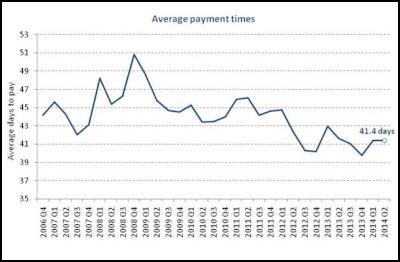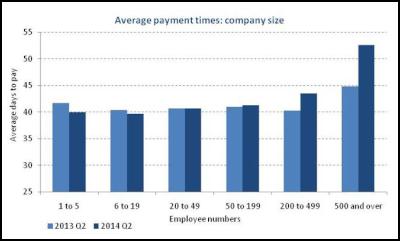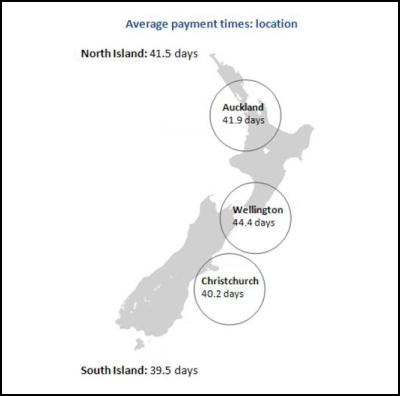Corporate sector sees cash flowing
CORPORATE SECTOR SEES CASH
FLOWING
Fastest Q2 payment times on
recordBusinesses in New Zealand are
experiencing a cash flow boost from the country’s strong
economic performance, with the average time taken for
invoices to be paid falling to the fastest second quarter
level on record.
With the economy growing at a higher-than-expected 0.7 per cent in the June quarter, businesses have demonstrated a greater capacity to manage their finances and pay their expenses on time. According to Dun & Bradstreet’s Trade Payments Analysis, 66 per cent of commercial invoices were paid promptly (between 1–30 days) during Q2 2014, an increase from 59 per cent the year before.
The jump in on-time payments has taken the average time for invoices to be paid to 41.4 days, the fastest rate measured for a second quarter. During the same period, Dun & Bradstreet also found that 30,435 businesses became a lower risk of making late payments in the year ahead, compared to the 19,613 which were deemed a higher risk.

Dennis Martin, Managing Director of Dun & Bradstreet in New Zealand, said that the latest business payment figures represented a continuation of the long-term improvement in business conditions since the global financial crisis.
“As evidenced by the latest GDP figures, New Zealand’s economy continues to perform strongly, with businesses benefitting from increased trade and a faster, more reliable cash flow,” Mr Martin said.
“This benefit is clear in the long-term trend for faster business-to-business payments, which has allowed businesses to get their hands on money sooner, pay their own bills sooner, invest back into their business with more confidence, and in turn, keep money flowing through the economy.
“Encouragingly, the business sector has shown an ability to maintain this rate of payments through 2014 while absorbing four interest rate increases and a high dollar; a resilience which may be called on should the current concerns about the Chinese economy be realised,” he added.
Despite slowing growth in China this year and weakening commodity prices, New Zealand’s substantial agriculture sector remained one of the fastest paying industries during the last quarter. D&B’sTrade Payments Analysis shows that the sector paid its invoices in an average of 36.4 days, two days faster than the year before and five days sooner than the all-industry average. At 34.9 days, businesses in the forestry sector were the fastest to settle their invoices during Q2 2014.
The country’s utilities sector continued to take the longest time to clear its accounts, with payments slowing over the past year from an average of 43.6 days to just under seven weeks (48.2 days).

Across industries, large companies employing more than 500 staff have been the slowest payers, averaging 52.5 days, a week slower than at the same time last year and 11 days later than the national average. Meanwhile, the country’s smallest operators have maintained speedy payment times. Businesses with between one-and-five staff took 40 days to pay their invoices, while those with between six-and-19 staff were slightly faster again, at an average of 39.6 days.

There was little difference in the payment performance of businesses across the country, with those operating on the south island marginally faster at paying their invoices, at 39.5 days, compared to 41.5 days in the north.

“The buoyant position of the New
Zealand economy continues to underpin strong cash flow in
the business sector and with that, low invoice payments
times,” said Stephen Koukoulas, Economic Adviser to Dun &
Bradstreet.
“With economic growth strong and the impact
of the interest rate rises from the RBNZ yet to hit
businesses’ finances, this latest analysis points to a
resilience and strength in the economy.
“The sustained
improvement in average payment times suggests that the
economic performance will remain healthy for some time to
come,” Mr Koukoulas added.
bout Trade Payments Analysis
Business-to-business payment information is a highly predictive data set and a critical element in credit risk scores and business failures forecasting.
The distinct advantage of trade information over other forms of company data is its ability to provide insight into current performance. Company financials, which are considered to be critical to effective decision making, are reported relatively infrequently and as a consequence, organisations may be required to make decisions using data that is up to 12-months old. Conversely, because trade information is reported monthly, it reveals how an organisation is paying its existing obligation.
Trade data is also effective across all business sizes, being the most predictive element in SME scores and the second most predictive (behind financials) in other credit scores. The predictive nature of trade data combined with its timely availability enables businesses to properly assess credit risk.
This includes the identification of both high and low risk customers, thereby enabling firms to minimise the risk of late payments and bad debts and identify the good credit accounts that will create long-term, profitable credit relationships.
About Dun & Bradstreet
Established in 1887, Dun & Bradstreet is Australia and New Zealand’s longest-established credit information bureau. Backed by its extensive financial database, D&B helps businesses to make informed credit decisions, and consumers to access personal credit information.
D&B works across the entire credit lifecycle to deliver data-driven solutions in sales and marketing, credit reporting and debt management.
Through analysis of financial and behavioural information, D&B also provides current and predictive assessments of the economy, business conditions and credit activity.
ENDS


 Ngā Pae o te Māramatanga: Māori Concerns About Misuse Of Facial Recognition Technology Highlighted In Science
Ngā Pae o te Māramatanga: Māori Concerns About Misuse Of Facial Recognition Technology Highlighted In Science Retail NZ: Retailers Call For Flexibility On Easter Trading Hours
Retail NZ: Retailers Call For Flexibility On Easter Trading Hours WorkSafe NZ: Worker’s Six-Metre Fall Prompts Industry Call-Out
WorkSafe NZ: Worker’s Six-Metre Fall Prompts Industry Call-Out PSGR: Has MBIE Short-Circuited Good Process In Recent Government Reforms?
PSGR: Has MBIE Short-Circuited Good Process In Recent Government Reforms? The Reserve Bank of New Zealand: RBNZ’s Five Year Funding Agreement Published
The Reserve Bank of New Zealand: RBNZ’s Five Year Funding Agreement Published Lodg: Veteran Founders Disrupting Sole-Trader Accounting in NZ
Lodg: Veteran Founders Disrupting Sole-Trader Accounting in NZ



